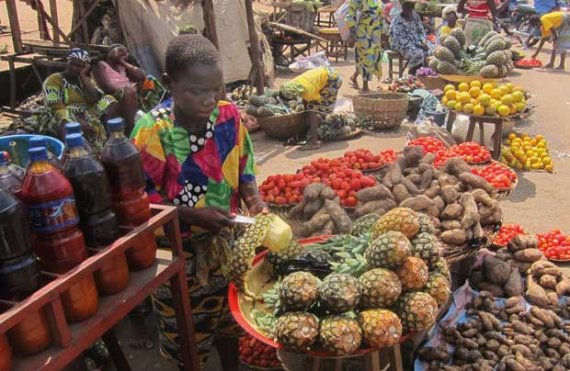Pineapple production is booming in the African country of Benin. In 2006 there were about 2500 pineapple farmers; in 2009 there were already 4000. They produce primarily for export and neighbouring country Nigeria is their biggest customer. Most of them are smallholders with no more than one hectare of land. Although the demand for pineapple is on the rise, most of them hardly benefit from it at all, discovered PhD researcher Djala Arinloye, who spent four years studying pineapple cultivation in Benin. ‘The farmers work hard but earn little money,’ he says. In his view, this is because they do not know the market prices and do not have direct access to the export market. So it is the intermediaries who swallow the profits. More information about prices and potential markets would be an enormous help to the farmers, claims Arinloye. He proposes a surprising solution: an SMS text messaging service for the farmers that provides them with information about prices and markets in their own language. So does a poor Beninese pineapple farmer own a mobile phone then? Sure, says Arinloye. Eighty seven percent of the small farmers own a mobile phone, even though only 30 percent of them can read and write. ‘The rest get their children or neighbours to read their messages to them,’ says the researcher.
Added value
To implement his plan Arinloye suggests setting up a public-private platform. He identified the parties which should collaborate in the SMS information service. These include one of the five big mobile network providers in Benin. And an important source of information is the National Statistics Information Institute of Benin, which collects a lot of market information about pineapple, but does not distribute it. It is also important to enable buyers, traders and processers to communicate their demand for pineapple and to enable the national research institute to pass on information about such things as disease control online. The combination of these kinds of information has added value for the farmers, as Arinloye knows from experiences in the field in Ghana. Together with two other PhD researchers, Arinloye gave a presentation in February to the intended participants in the information platform in Benin. He is now writing a project plan with a view to getting the SMS information service off the ground in one year. To achieve this he needs to bring the relevant parties together, buy a license and organize training for the farmers. Arinloye is convinced he will get the necessary investment – 150,000 dollars – together. ‘Otherwise my research and recommendations are useless.’
Djalalou-Dine Arinloye will receive his phD on 25 April from Onno Omta, professor of Management Studies, and Tiny van Boekel, professor of Food Quality and Design.

